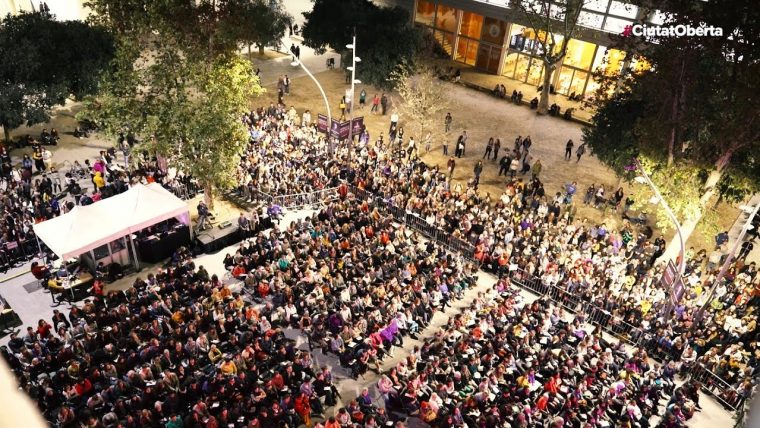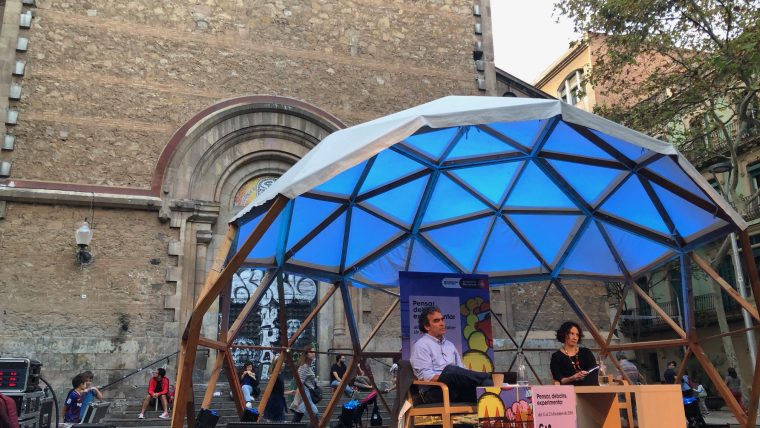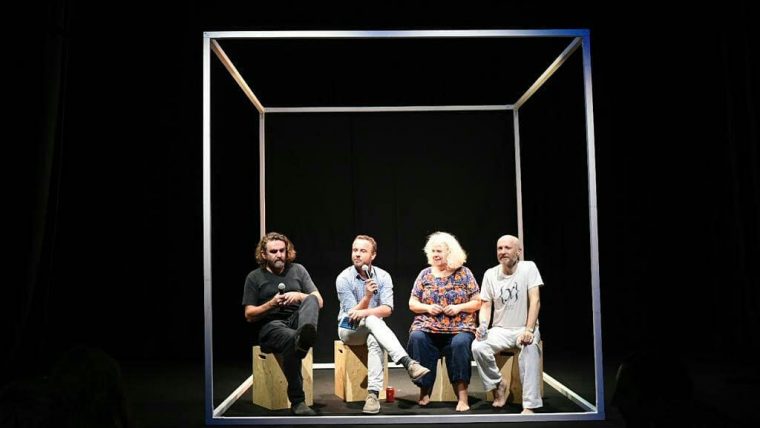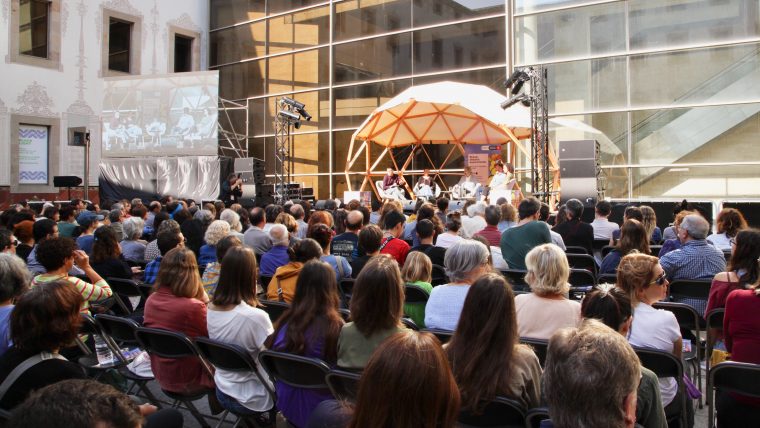Reflections on democracy, technology and city, the cornerstones of the coming edition of “Open city”
The second edition of the “Open City” Biennial of Thought takes place from 13 t5o 18 October. This is a meeting dedicated to analysing the transformations of this change of era, pooling innovation projects, analysing diversity and, ultimately, reflecting on the great challenges of contemporary society, putting special emphasis on the contributions that may be made to this urban-area debate. The digital revolution, the globalised economy and scientific advances are joining challenges such as climate change, the future of work and increased inequalities. All these factors will be debated by the speakers taking part in this new edition of the Biennial.
Els experts i expertes en àmbits diversos que participaran en la Biennal de Pensament es preguntaran com fer front d’una manera col·lectiva a aquests reptes des de punts de vista, disciplines i camps del coneixement especialment diversos, amb projectes de futur realistes i sostenibles, un llenguatge assequible i a l’abast de la població en general i tenint en compte els reptes que ha plantejat la crisi sanitària de la covid-19. I ho faran a través de tres eixos, que marcaran els debats i les activitats de “Ciutat oberta”.
Tecnologia
La tecnologia, que havia estat fins ara la font principal de les visions alternatives al món real, s’ha vist superada finalment per l’emergència climàtica i sanitària. Aquestes crisis, però, ofereixen la possibilitat de canviar la cultura de dret al consum de serveis en què vivim instal·lats per una altra que es basi en la gestió reflexiva i comunitària dels recursos.
Urbanisme i ciutat
A l’hora de pensar en el futur, les ciutats segueixen sent escenaris clau. Són un punt de trobada i espais on relacionar-se, però fan front als reptes de convertir-se en espais més habitables, dotats de mecanismes digitals que permetin la coexistència dels nivells global i local, espais sostenibles des del punt de vista ecològic que, a més, tinguin cura dels qui hi viuen… Experts de camps diversos reflexionaran sobre els interrogants, que són a la vegada oportunitats de canvi, que planen sobre les nostres ciutats: des de l’accés a l’habitatge fins als nous models de mobilitat, passant per la integració de l’ecologia i la sostenibilitat. Es tracta, en definitiva, de repensar les ciutats posant la vida i les persones al centre del seu disseny.
El futur de la democràcia
The experts in diverse fields taking part in the Biennial of Thought will be asked how to take on these challenges collectively from especially diverse points of view, disciplines and fields of knowledge, with realist and sustainable future projects, a reasonable language and within reach of the general population and by taking account of the challenges that the COVID-19 health crisis has raised. They will be doing all that through three areas, which will frame the “Open city” debates and activities.
Technology
Technology, which had so far been the main source of alternative views in the real world, has finally been overwhelmed by the climate and health emergency. These crises, however, offer a possibility for replacing the service-consumption right culture we live in with another based on a reflective and community management of resources.
Urban planning and city
When it comes to thinking about the future, cities continue to be key scenarios. They are a meeting point and spaces for interacting, but they are also taking on the challenges of becoming more habitable spaces, provided with digital mechanisms that enable co-existence on global and local levels, sustainable spaces from the ecological point of view which, what is more, look after those living in them … Experts in different fields will be reflecting on the issues, which are also opportunities for change, hovering over our cities: from access to housing to new mobility models, not to mention integration of ecology and sustainability. This is ultimately about rethinking cities putting life and people at the centre of their design.
The future of democracy
The direction and future of democracy in the times we are living in will be the third area of the meetings. Is this political system as bound up with the market economy as we have been led to believe? Does the extractive logic of capitalism strengthen or weaken citizenship? Populism, a term yet to be defined beyond partisan fighting, and the expansion that it has recently seen, will be another of the issues to be debated, as will the necessary transformation of citizen awareness required for integrating an ecological and environmental transition to the cities of the immediate future.
The Biennial is led by an advisory council, made up by the Centre de Cultura Contemporània de Barcelona (CCCB); the architect Josep Ferrando; the moral and political philosophy lecturer, Daniel Gamper; the designer and activist, Adrià Garcia Mateu; the architect, researcher, communicator, musician and singer-songwriter, Núria Moliner; the journalist and researcher Marta Peirano, and the philosophy lecturer César Rendueles.
Guests taking part as speakers in the various Biennial activities include artists such as the writer Margaret Atwood, the musical performer (and performer of many other things) Maria Arnal, the La Calòrica theatre company, the poet Enric Casasses, the choreographer and dancer Núria Guiu, the writer Cristina Morales, the artist Alicia Kopf, the South African poet and rhapsodist Koleka Putuma, the artist Jesús C. González Fernández (¥€$Si Perse) and the writer Irene Solà, to name but a few. Also taking part in the meetings will be thinkers ranging from the philospher Marina Garcés to Alícia García Ruiz, Javier Gomà, Ignacio Sánchez Cuenca, the anthropologist Yayo Herrero, the writer and philosopher Santiago Alba Rico and the professor of political philosophy Daniel Innerarity.
Architects, urban planners and experts in cities such as Jaime Palomera, the PhD in geography Mara Ferreri, the geographer Oriol Nel·lo, the journalist and anthropologist Núria Alabao, the specialist in urban planning Tomás Díez and the architects Elena Albareda, Izaskun Chinchilla and Coque Claret will be joining in, among many others, a festival of ideas where there will also be a space for activists such as Sasha Constanza-Chock, Anne Cath, Peter Frase, Adrià Garcia Mateu, the anthropologist Emilio Santiago Muíño and Òscar Guayabero.
The list of participants will be rounded off by a series of scientists, notably including the North American Neil Gershenfeld, the epidemiologist Manuel Franco and the philosopher Helen Hester.
The list is even longer. If you wish to find out who all the speakers will be at the “Open City” Biennial of Thought and discover more about this meeting, check out its website from September on.










